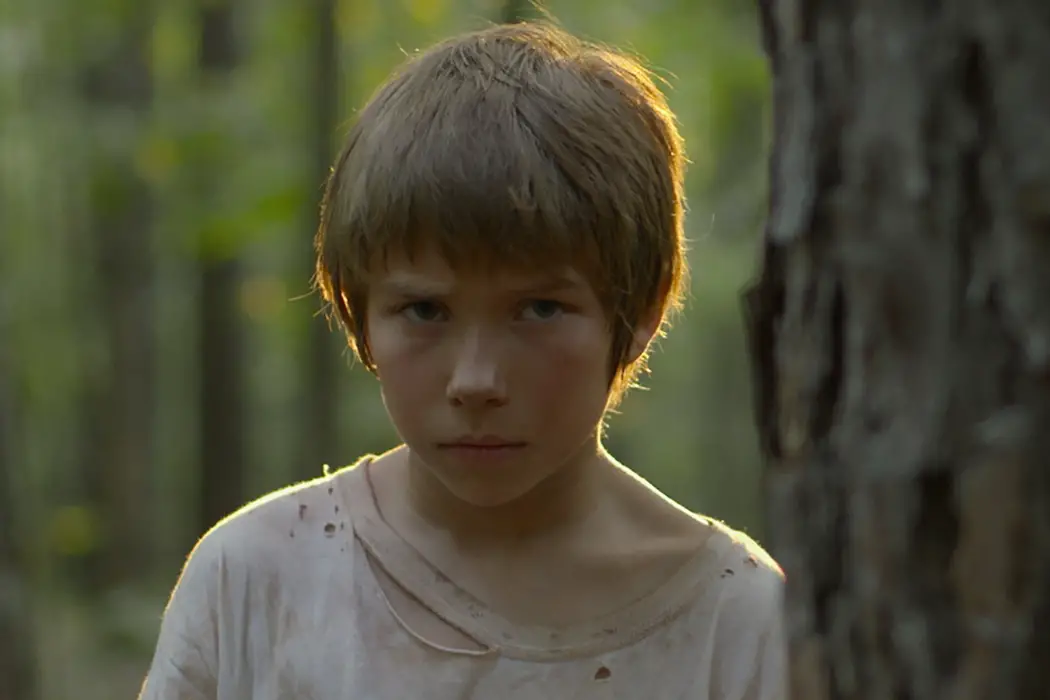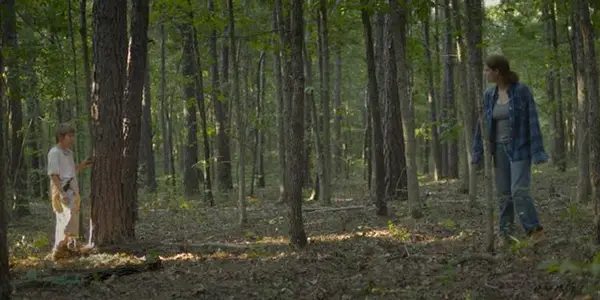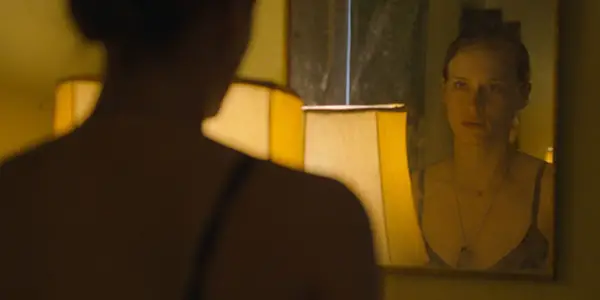LOST CHILD: Folktale Thriller Is Stretched Out & Saccharine

Brianna Zigler is a 23-year-old film journalist based in the…
As someone who has no idea what goes there, the Ozarks seem like a undeniably destitute place; crippled by apparent drug abuse and poverty the likes of which the 2010 film Winter’s Bone portrayed in a way that was both affecting and chillingly stark. Debra Granik‘s feature, and the breakthrough role for actress Jennifer Lawrence, was a striking, sometimes nauseating, but undeniably tender study of family, mental illness, self-sufficiency, and the way these peoples’ lives are united and affected by the underworld of illegal drugs.
Lost Child (originally titled Tatterdemalion) deigns to tackle most of these same concepts and more, throwing in a creepy Southern folktale about an ageless child demon and last-century ideals about women’s natural affinity for motherhood. But what could have been an exceedingly creepy thriller-drama, combining the strength of a film like Winter’s Bone, ends up coming off more like a strung-out Lifetime movie, distracted by its own self-important messaging and a narrative that doesn’t seem to know where it wants to end up.
Beware the Tatterdemalion
Ozark native Fern (Leven Rambin) has returned home from her time serving in the Marines, to her daddy’s derelict old shed of a house, a less-than-warm welcome from neighborhood friend, Florine (Toni Chritton Johnson), and the absence of her troubled younger brother, Billy (Taylor John Smith). As she frequents the local bar, becoming better than acquainted with the bartender-slash-social worker Mike (Jim Parrick), and searches for the missing Billy, she comes across a strange sight wandering alone within the looming darkness of the Ozark wilderness (of which Florine warned Fern to stay away). A young boy of no more than nine or ten saunters aimlessly and unprotected, until Fern reaches out to him and takes his hand.

Fern leads the young boy, Cecil (Landon Edwards), back to her house, and it is there that Cecil commences his stay in Fern’s reluctant care. But not long after taking Cecil in, Fern begins to exhibit symptoms of a strange and sudden illness. She visits the closest doctor within the limits of her town, who practices not in an office, but out of his own home (to find a “real” doctor, Florine tells her, Fern would have to travel something like 30 or 40 miles away). The doctor becomes suspicious of the arrival of Fern’s symptoms in tangent with her discovery of the lost boy, and he writes her a note before ending their session with only one cryptic word scrawled on it: “Tatterdemalion.” Growing sicker and more suspicious, Fern becomes determined to discover the identity of young, wayward Cecil – quite possibly, before it’s too late.
Almost a Hit, But Misses
Lost Child first builds as a beautiful slow burn, its flourishes of witchcraft, demons, and mysticism wonderfully accentuating the dramatic character study and elevating the narrative into an intriguing supernatural mystery. But, eventually, the flair for the otherworldly runs its course, and the real-life drama that is supposed to anchor the film is both too poignant and not poignant enough, while feeling like it’s stretching itself thin just to fill the run time. Though the film spends most of its time meditating on its characters, it doesn’t really seem like there’s enough to them to meditate on in the first place. Complexities merely scratch the surface, but are not given enough time to truly scan the depths in order to create more compelling characters and relationships between them.

Leven Rambin portrays the damaged, brooding Fern in a way that attempts to mine the potential intricacies of a character we don’t really get to know well enough; at the same time, making sure that Fern is always a little more than simply a scowling face. Fern’s embattled history and fairly cynical mindset are put on the forefront of Rambin’s portrayal, despite the fact that we don’t get nearly close enough to ever truly feel connected with her. However, child actor Landon Edwards steals the show as Cecil, whose delicate innocence is punctuated by a suspicious amount of maturity for his age and an undeniably sinister aura. The way Edwards moves seamlessly from helpless child to potential threat is impressive, and the weight of this incredibly hurt character is constantly present within Edwards’ acting. In the meantime, though memorable as John Keene in HBO’s Sharp Objects, Taylor John Smith’s Billy is more melodramatic than anything, and much less evocative of the aching intensity, rage, and sorrow he clearly hoped to be bringing to the table.
The film’s score often feels misused and out-of-pace, robbing potentially tense scenes of any tension at all, or imbuing a sense of lightness into situations that intend to evoke unease. The cinematography – though occasionally haunting – is mostly uninspired. Draped under a haze of muted grays, browns, and greens, it never adds quite enough atmosphere to the ever-running undercurrent of mystery and suspense that the film is clearly trying to evoke, accompanied by production design that comes just short of truly cinematic.
There is a nod early-on to Fern’s inherent desire to be a mother, despite her outward displays of aversion to Cecil, and it’s the low-hanging fruit that acts as the emotional cornerstone of the narrative and ultimately brings down much of the film. This idea that, secretly, every woman wants to be a mother is then bolstered by an on-the-nose-speech from Mike about how it’s every woman’s dormant instinct to care for children. Not only is it an outdated view of women that leaves a sour taste in one’s mouth after watching the film, but it feels backwards to be the messaging of a film coming out in 2019. Not every woman wants to be a mother, and it’s a bit eye roll-inducing to make such a sweeping and outdated generalization such as this for a modern film’s moral foundation.
Lost Child: Conclusion
Lost Child has an unquestionably compelling structure, but it becomes too drenched in its own sentimental messaging. While it attempts to touch on issues such as family, poverty, and drug abuse, it comes across as distracted and doesn’t give its themes the care and density they deserve. And despite a promising first act, the film simply drags itself on a road to nowhere, hindering both its character studies and its potential for inducing goosebumps, leaving an end result that is as unfulfilling as it is frustrating.
What are your thoughts on Lost Child? Let us know in the comments!
Does content like this matter to you?
Become a Member and support film journalism. Unlock access to all of Film Inquiry`s great articles. Join a community of like-minded readers who are passionate about cinema - get access to our private members Network, give back to independent filmmakers, and more.
Brianna Zigler is a 23-year-old film journalist based in the Philadelphia suburbs and an alumni of Penn State University. She is a staff writer for Screen Queens, has bylines in Reel Honey Mag and Much Ado About Cinema, and has had a short story published in the horror literary journal Hinnom Magazine. She loves bad movies, Twin Peaks, and her pet parrot.














